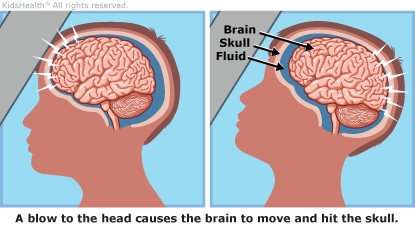- Parents Home
- Para Padres
- A to Z Dictionary
- Allergy Center
- Asthma
- Cancer
- Diabetes
- Diseases & Conditions
- Doctors & Hospitals
- Emotions & Behavior
- First Aid & Safety
- Flu (Influenza)
- Food Allergies
- General Health
- Growth & Development
- Heart Health & Conditions
- Homework Help Center
- Infections
- Newborn Care
- Nutrition & Fitness
- Play & Learn
- Pregnancy Center
- Preventing Premature Birth
- Q&A
- School & Family Life
- Sports Medicine
- Teens Home
- Para Adolescentes
- Asthma
- Be Your Best Self
- Body & Skin Care
- Cancer
- Diabetes
- Diseases & Conditions
- Drugs & Alcohol
- Flu (Influenza)
- Homework Help
- Infections
- Managing Your Weight
- Medical Care 101
- Mental Health
- Nutrition & Fitness
- Q&A
- Safety & First Aid
- School, Jobs, & Friends
- Sexual Health
- Sports Medicine
- Stress & Coping
A to Z: Concussion
A concussion is a brain injury that causes temporary changes in how the brain works. It's usually a result of impact or a blow to the head.
More to Know
A person doesn't have to lose consciousness ("pass out") to have a concussion. A person with a concussion may have headaches, dizziness, and trouble sleeping. He or she may also have changes in mood and thinking. Symptoms usually start within 1 to 3 days of a blow to the head and can last for weeks or longer.

Anyone who has a head injury should be watched closely for signs of a concussion, even if the person feels OK. An undiagnosed concussion can put someone at risk for brain damage and even disability. So anyone who has any symptom of a concussion should be examined right away by a doctor.
If your child might have had a concussion, go to an emergency room if he or she has any of these symptoms:
- loss of consciousness
- severe headache, including a headache that gets worse
- blurred vision
- trouble walking
- confusion and saying things that don't make sense
- slurred speech
- unresponsiveness (you're unable to wake your child)
Call your doctor right away to report other problems, such as vomiting, dizziness, headache, or trouble concentrating. Then you can get advice on what to do next. For milder symptoms, the doctor may recommend rest and ask you to watch your child closely for changes, such as a headache that gets worse.
Keep in Mind
Symptoms of a concussion don't always show up right away, and can develop within 1 to 3 days after an injury. Young children usually have the same physical symptoms as older kids and adults, but cognitive and emotional symptoms (such as irritability and frustration) can appear later, be harder to notice, and last longer. Sleep-related issues are more common in teens. Though most kids recover quickly from concussions, some symptoms — including memory loss, headaches, and problems with concentration— may linger for weeks or months. It's important to watch for these symptoms and contact your doctor if they last.
All A to Z dictionary entries are regularly reviewed by KidsHealth medical experts.

© 1995- The Nemours Foundation. KidsHealth® is a registered trademark of The Nemours Foundation. All rights reserved.
Images sourced by The Nemours Foundation and Getty Images.
